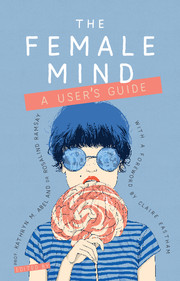Book contents
- Frontmatter
- Acknowledgements
- Contents
- Foreword
- Introduction: being female
- Part I Women in perspective
- Part II Women and society
- Part III Women and their environment
- Part IV Women and specific disorders
- 18 Depression and other mood disorders
- 19 Anxiety disorders
- 20 Trauma and post-traumatic stress disorder
- 21 The dangers of rumination
- 22 Obsessive–compulsive disorder
- 23 Eating disorders and body dysmorphic disorder
- 24 Psychosexual disorders
- 25 Personality disorders: risks and recovery
- 26 Self-harm
- 27 Women and addiction
- 28 Autism spectrum disorder
- 29 Attention-deficit hyperactivity disorder
- 30 Psychotic illness
- 31 Postnatal depression and postpartum psychosis
- 32 Living longer: normal age-related changes, dementia and depression
- Part V Women and treatment
- Contributors
- Index
21 - The dangers of rumination
from Part IV - Women and specific disorders
Published online by Cambridge University Press: 02 January 2018
- Frontmatter
- Acknowledgements
- Contents
- Foreword
- Introduction: being female
- Part I Women in perspective
- Part II Women and society
- Part III Women and their environment
- Part IV Women and specific disorders
- 18 Depression and other mood disorders
- 19 Anxiety disorders
- 20 Trauma and post-traumatic stress disorder
- 21 The dangers of rumination
- 22 Obsessive–compulsive disorder
- 23 Eating disorders and body dysmorphic disorder
- 24 Psychosexual disorders
- 25 Personality disorders: risks and recovery
- 26 Self-harm
- 27 Women and addiction
- 28 Autism spectrum disorder
- 29 Attention-deficit hyperactivity disorder
- 30 Psychotic illness
- 31 Postnatal depression and postpartum psychosis
- 32 Living longer: normal age-related changes, dementia and depression
- Part V Women and treatment
- Contributors
- Index
Summary
Kim's story (part 1)
Kim had never really recovered from the upset of finding a breast lump. Her mother had died of breast cancer in her mid-40s, so the discovery of the lump brought back memories from the darkest period in her life, although the lump was eventually diagnosed as benign. Kim panicked that she did indeed have cancer herself. She subsequently became preoccupied with whether to find out if she carried the breast cancer gene. If her genetic risk was high enough, she might consider a preventive mastectomy.
Kim spent all her time at work searching the internet for information on genetics and breast cancer, leading her into trouble with her boss. On top of that, her boyfriend was becoming exasperated by the fact she could discuss nothing but tumour research and the latest celebrity to be diagnosed with cancer. A surgeon she consulted tried to explain that she needed to stop obsessing about breast cancer. But this only seemed to make things worse. Kim became convinced she must be going mad, because she realised she was unable to control her own thoughts and cease brooding.
Women are twice as likely as men to have serious feelings of depression. Some forms of low mood are very specific to women, including the ‘baby blues’, postpartum depression, sadness around menopause, and melancholy linked to menstruation. However, the gap between rates of severe depressive feelings in women and men has been narrowing in recent years. Improved access to education, employment and effective birth control might have reduced women's exposure to stress. Women today have more access to what might have traditionally helped men deal with negative feelings – the distraction of work outside the home, a wider social circle (with office colleagues) and financial independence.
Surveys have found that women tend to report more positive emotions as well as more negative ones (Fujita et al, 1991). Women might experience more emotion, or more variation in emotion, or they might simply be more aware of their moods than men are.
Studies suggest women have more ‘internalising’ disorders, in which difficulties centre on an unpleasant internal experience (e.g. depression, anxiety, panic, phobia). Men tend to have more ‘externalising’ disorders, in which outward behaviour is problematic (e.g. attention-deficit hyperactivity disorder, violence, alcohol and drug dependency) (Kramer et al, 2008).
- Type
- Chapter
- Information
- The Female MindUser's Guide, pp. 135 - 138Publisher: Royal College of PsychiatristsPrint publication year: 2017



